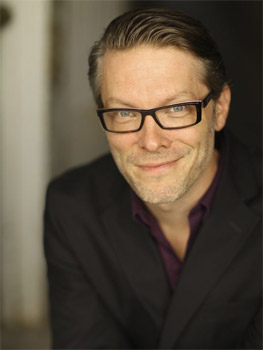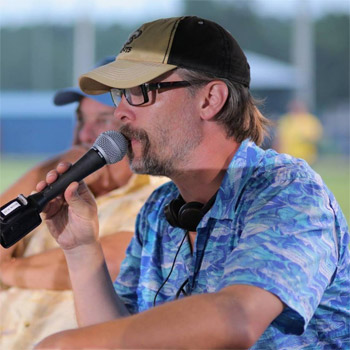Miles Doleac The Hollow Interview

Miles Doleac The Hollow Interview
Miles Doleac is an actor, known for his role on Banshee, that recently crossed over into filmmaking. His new film is The Hollow and he also recently signed up for the new CW series Containment.
Interview with Miles Doleac
Question: What originally inspired you to begin acting?
Miles Doleac: I've been enamoured with movies since I saw 'Raiders of the Lost Ark" as a six-year-old kid. I grew up doing theatre in my hometown of Hattiesburg, MS. We had a pretty thriving community theatre scene and my local high school also boasted what was, at that time, the best drama program in the state (and perhaps beyond). I was fortunate to have all these outlets to perform and a family who was supportive of this weird passion of mine. But, movies always held this magic for me. Going to the movies was always an event. I knew I had to be part of that world in some way.
Question: What is The Hollow?
Miles Doleac: The Hollow is a southern-noir crime drama, set against the cultural and geographic backdrop of small-town Mississippi. A U.S. Congressman's daughter passing through our small town is murdered in a mysterious triple homicide, bringing a team of FBI agents down to investigate. The town is full of secrets, some of them pretty dark. As the FBI starts to peel back the layers of the onion, they find themselves in conflict with the local sheriff's department, which seems to be throwing up road blocks to solving the investigation. I wanted to write something where Mississippi loomed large. I wanted to write something that hearkened to and paid tribute to some of my literary heroes" Tennessee Williams, William Faulkner, Eudora Welty"and the rich literary legacy of my home state and its complicated cultural ethos. I like to call it my southern-noir western; it has a lot of elements that fold into that genre.
Question: Why did you decide to try filmmaking?
Miles Doleac: I was in Louisiana right after Hurricane Katrina getting my PhD at Tulane. Immediately after Katrina, the film and television industry invested in south Louisiana. Suddenly, film and television production was booming. It was everywhere. There were a lot of big shows, but there were a lot of little, indie shows as well. A lot of great indie filmmakers were doing their own projects, based on Louisiana's tax rebate program, and I had the good fortune to be involved with two of them. One was called 'Jake's Road," written and directed by Mike Mayhall. He assembled this wonderful cast, none of which were huge names with the exception of Eric Roberts. It was a character driven horror film he built from the ground up. He raised all the money. He shot it for a hundred grand or so; an absolute pittance in the filmmaking world. And, guess what, it was a positively fantastic experience. I worked with actors like Leticia Jimenez and Garrett Hines, who would later show up in 'The Historian" and 'The Hollow," respectively and forge friendships that remain deeply important to me. Shortly before 'Jake's", I did a short film with a director named Dustin Schuetter called 'Rejects." I was so impressed with these guys and their passion. They're out there making their own films. They're not talking about it; they're doing it. Having lived in LA, the one thing I noticed about everyone there is they all have scripts. They're all talking about making movies, but very few people actually do. I saw these guys doing it. It was Mike's film in particular and conversations I had with Mike that inspired me to the greatest extent. I thought, 'You know, I should be doing this, too." But it was really that moment when I said, 'I need to stop depending upon other people. I need to be making my own films." I had done this in the theatre. When I moved to New York after college, a buddy and I started a theatre company, and we put up our own shows. But film seemed so daunting, the prospect of mounting your own film. To begin, what's the story you want to tell? I had a real treasure trove of possibilities based on my experiences in academia and some of the characters I had run across, especially at Tulane. It was a time when I was sort of transitioning. I was finishing up my PhD, doing a visiting professorship at USM and seeing what a mess higher education was. I thought, 'There's a movie in here." So I sat down and began to write a monologue that was voiced by an old-school Jesuit educated professor of Classics who was so over the current state of affairs and the sort of malaise that has latched itself onto higher education; this assembly-line style of higher education, how students are spoon-fed everything and education for education's sake is no longer respected. I thought, 'How would this guy react in that setting?" So I wrote this monologue of him intellectually terrorizing a student in his office while demonstrating the practice of Roman crucifixion and those were the first words of 'The Historian." The fact is I just came to the realization that I had to make my own movies. It chooses you in a way, this all-consuming disease, and, rather than keep wondering why despite this nagging love for the thing, I wasn't really where I wanted to be, I decided to make it happen on my own.
 Question: What did you learn from the filmmaking experience of The Hollow?
Question: What did you learn from the filmmaking experience of The Hollow?
Miles Doleac: As a writer/director, your name will forever be linked with the film you ultimately produce, so you have to make your film, and you have to minimize all the noise, the voices, that would question why you're doing things a certain way or why you want a certain thing. Film is absolutely a collaborative process, but, at the end of the day, there must be a singular vision, a conductor who must decide the direction of a sometimes ungainly orchestra of parts and players. Anytime, on my first two films, I've gone against my creative instincts I've regretted it. But, then on indies, there are always budgetary constraints and logistics you can't control. You're trying to shoot 7 or 8 pages a day. It's finding balance and direction. You pull the people you trust close and listen and then you make decisions and own those decisions. You have to own your movie. If you're not ready to do that, you really shouldn't be directing.
Question: What was it like working with William Sadler?
Miles Doleac: Bill is such a pro. It's been such a pleasure, such an education really, working with him on two films now. He's so generous as an actor, such a delightful human being and, from day one on 'The Historian," he was willing to trust my judgment and vision, despite the fact that his years of experience far outstripped mine. It's hard for me to imagine doing a film without Bill. His performances in both films are so rich and layered. I'm so pleased that he decided to take that initial leap of faith with me on 'The Historian."
Question: What is Containment about?
Miles Doleac: I can't reveal too much, but the long and short of it is, a heretofore unknown virus breaks out in the city Atlanta, GA, forcing authorities to quarantine a large portion of the city. Families are separated on opposite sides of the cordon zone and, as people on both sides try to figure out what's going on, matters become increasingly complicated and violent. The situation is just rife with dramatic possibility and the writers absolutely make the most of it. I think the show is going to do very well.
Question: Can you tell us about your character in Containment?
Miles Doleac: I play Captain Lee Scott, the National Guard captain placed in charge of security outside the quarantine zone. My character and the Atlanta PD's liaison, Lex Carnahan (played by the wonderful David Gyasi), butt heads about how to handle the logistics of a situation that is quickly spiralling out of control.
Question: How has your filmmaking experience changed the way you act?
Miles Doleac: Absolutely. Sitting at the monitor or in the editing room, pouring over every fine nuance of a performance, you really learn what works and what doesn't. You see up-close how the tiniest variant can bring a scene or a line to life in a whole new way. I think the best actors, like the best writers, have to be great thieves. You find what works or what you love or what moves you in someone else's work and you bring it into your own. People say actors are ego-maniacs, but in a way, you have to be ego-less. As an actor, you have to be willing to acknowledge that someone else's way, be it another actor, a director … may be better than yours. As an actor, you're kind of this big lump of clay, moulding and chiselling yourself (often with much trial and error) into the best incarnation of you, but that often entails incorporating a veritable potpourri of inspirations from other artists. Art really is such a communal thing.
Question: What's next for you, in 2016?
Miles Doleac: Lisa Bruce, our EP on The Hollow, has asked me to direct a wonderful, timely character drama called Comes An Angel (written by Lisa's partner and Hollow co-producer, Mark Ryland). We hope to be shooting that in summer 2016. I'll be directing some theatre this year too and, hopefully, working on season 2 of Containment in the fall. I've also completed a new script of my own that we'll get the ball rolling on at some point this year.
Question: What advice do you have for young actors?
Miles Doleac: Be fearless. Don't be afraid to fall flat on your face. And, whenever possible, make your own work. Nobody is out there chomping at the bit to hire an unknown. You have to make them see you. Oftentimes that means taking your destiny into your own hands.
Interview by Brooke Hunter
MORE





